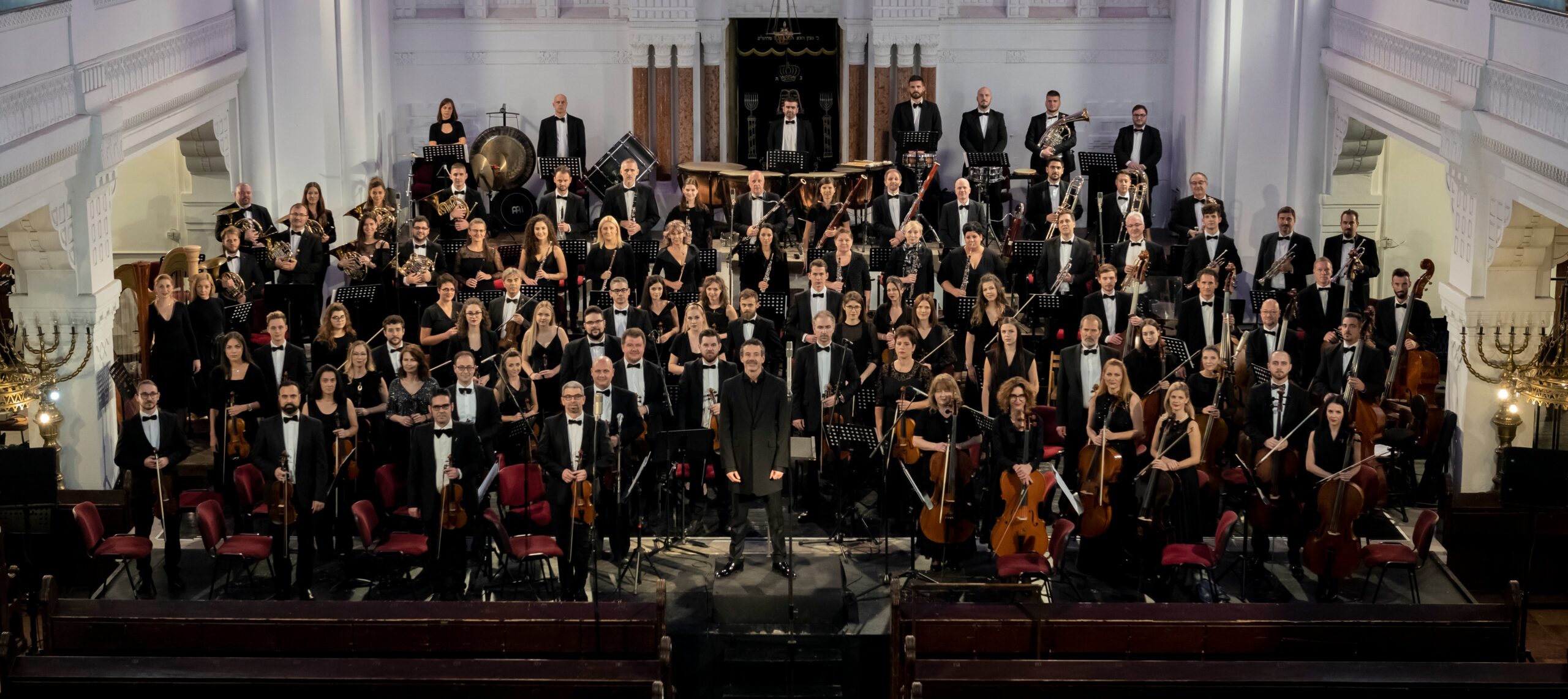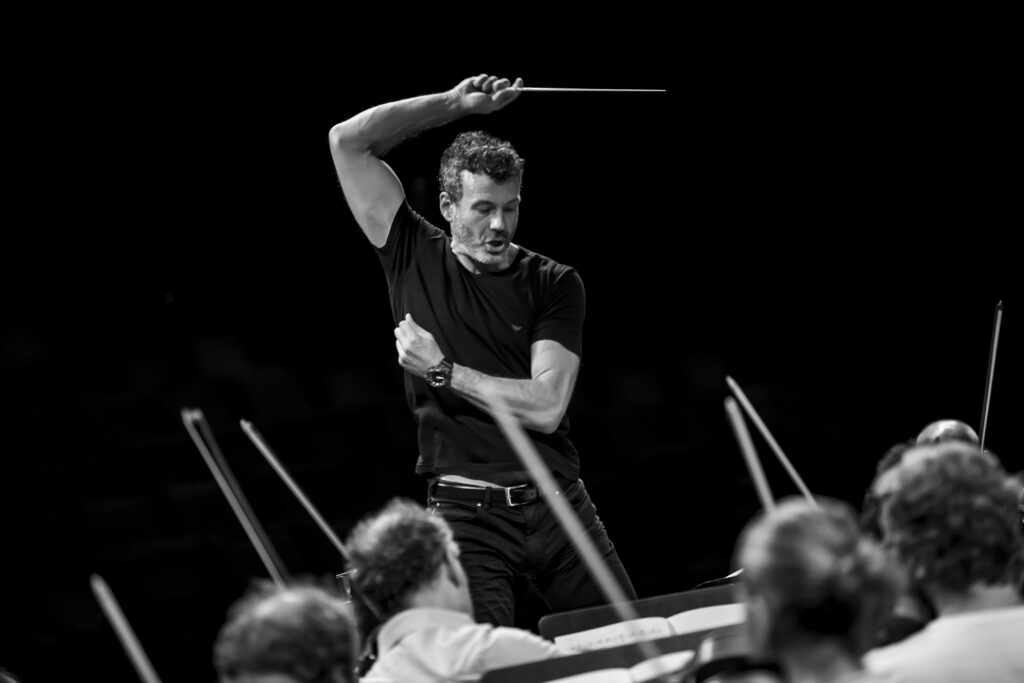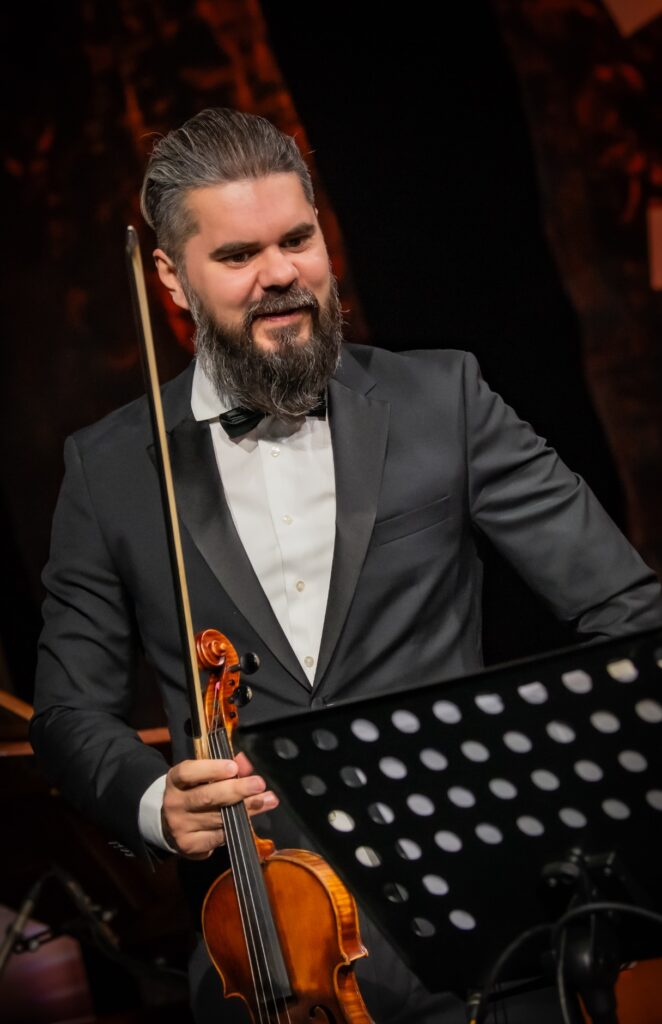
VOJVODINA SYMPHONY ORCHESTRA
The Vojvodina Symphony Orchestra was founded in February 2011 as the artistic successor of the former Vojvodina Symphonists, with the aim of fostering the development and visibility of symphonic art and its creators on both the local and international level. Organized on a stagione principle, over the past decade the orchestra has built a reputation as an ensemble that is artistically mature, technically reliable, and interpretatively inspiring. The orchestra’s repertoire encompasses the classical symphonic canon, masterpieces of the late Romantic era, as well as selected works of the 20th and 21st centuries, with a particular emphasis on contemporary works by domestic composers. Alongside its standard concert repertoire, the orchestra develops thematic projects and popular programs, reaching a wider audience through genre and formal diversity. Among these are concerts such as Disney Concert: Magical Music from the Movies at MTS Hall in Belgrade, programs for children, and traditional New Year’s Gala concerts, within which the orchestra has performed with some of the greatest names on the world music scene, such as Mischa Maisky and Maxim Vengerov. The Vojvodina Symphony Orchestra traditionally opens the renowned international NOMUS Festival, thereby maintaining a long-standing collaboration with the Jeunesses Musicales of Novi Sad.
So far, the orchestra has realized around 150 concerts in cooperation with eminent conductors and soloists from Serbia and abroad. Among the conductors who have led the orchestra are Emil Tabakov, Gianluca Marcianò, Timothy Redmond, Leopold Hager, Marko Hribernik, Maximilian Haberstock, Giuseppe Mengoli, Alan Bjelinski, Gabriel Bebeșelea, Bojan Suđić, Aleksandar Kojić, Srboljub Dinić and Aleksandar Marković. Soloists who are included are Valery Oistrakh, Sreten Krstić, Nicolas Altstaedt, Shlomo Mintz, Polina Osetinskaya, Nemanja Radulović, Roman Simović, Ivo Pogorelich, Julian Rachlin, Narek Hakhnazaryan, Peter Bence, Michael Spyres, Željko Lučić, as well as the ensembles Janoska and Terem Quartet. The orchestra made its first international appearance in 2014 under the baton of Maestro Berislav Skenderović, performing at the 60th Split Summer Festival and the 65th Dubrovnik Summer Festival. For its artistic achievements, the ensemble was twice awarded the title Orchestra of the Year (2014 and 2023) by “Muzika Klasika” magazine. It has successfully performed in the most prestigious concert venues in Serbia, including the Grand Hall of the Kolarac Endowment, where it debuted in 2015 and has regularly appeared since 2022. It has also performed at the Belgrade Music Festival (BEMUS), where in October 2024 it gave a concert with Jonas Kaufmann in the Blue Hall of the Sava Center. The 2021/2022 season marked an important turning point in the orchestra’s development with the arrival of its first Chief Conductor, Maestro Aleksandar Marković, an artist with a distinguished international career. Until June 2023, the orchestra presented a number of significant programs, including a performance with Julian Rachlin at the opening of the Kaleidoscope of Culture – KORZO Festival in 2022, Verdi’s Requiem in collaboration with the Opera Choir of the Serbian National Theatre and an international quartet of soloists, as well as a performance of Gustav Mahler’s Symphony No. 2.
The 2024/2025 season featured collaborations with world-class artists such as Jonas Kaufmann, Željko Lučić, and Michael Spyres, pianists Simon Trpčeski and Eva Gevorgyan, violinists Maria Milstein and Lana Zorjan, cellist Ivan Sendecki, and percussionist Nebojša J. Živković. Guest conductors included Maximilian Haberstock, Gabriel Bebeșelea, Maxim Rysanov, Mikica Jevtić, and Giuseppe Mengoli. The upcoming 2025/2026 season will be marked by the return of Maestro Aleksandar Marković as Chief Conductor, with a programmatic focus on the works of symphonic titans and interpretations of “classical strength in a contemporary expression,” in line with the orchestra’s distinctive artistic identity.

A visionary of sound with a keen sense of style, Aleksandar Marković brings scores to life with a rare synergy of artistic sensitivity, expressive leadership, and profound understanding of musical structure. He completed his conducting studies in the class of Leopold Hager at the University of Music and Performing Arts in Vienna. He attended masterclasses at the Accademia Musicale Chigiana in Siena, where he was awarded an honorary diploma. He was a recipient of a scholarship from the Herbert von Karajan Foundation in Berlin and the winner of the 7th International Conducting Competition “Grzegorz Fitelberg” in Katowice, Poland.
Starting in the autumn of 2025, following a fruitful collaboration in the period 2021–2023, he will once again take on the role of Chief Conductor of the Vojvodina Symphony Orchestra. In the same period, he begins his collaboration with the State Philharmonic in Košice, Slovakia, where he will conduct across four program cycles during the upcoming concert season. Since 2022, he has been the Principal Guest Conductor of Sinfonia Varsovia, with whom he has performed at festivals and concert halls across Europe, led the orchestra’s jubilee concerts, appeared at the 19th edition of the Lutosławski “Chain” Festival and the Sinfonia Varsovia Summer Festival, and realized several recording projects: violin concertos by Pierre Wissmer with Oleg Kaskiv, and violin concertos by Karol Szymanowski and Carl Nielsen with Anna Agafia for the Swiss label Claves, as well as Sergei Rachmaninoff’s Rhapsody on a Theme of Paganini with Nathanaël Gouin for the French label Mirare.
He made his American debut in 2020 at Seattle Opera, conducting Pyotr Ilyich Tchaikovsky’s Eugene Onegin. In the 2016/2017 concert season, he served as Music Director of Opera North, and from 2009 to 2015, he was Music Director and Principal Conductor of the Brno Philharmonic, where he shaped the orchestra’s distinctive sound. From 2005 to 2008, he was Chief Conductor of the Tyrolean State Theatre in Innsbruck, where he conducted notable productions of the standard operatic repertoire.
He has appeared with numerous renowned ensembles, including the Vienna Symphony Orchestra, Vienna Chamber Orchestra, Vienna Concert Society, Konzerthaus Orchestra Berlin, Deutsches Symphonie-Orchester Berlin, Mozarteum Orchestra Salzburg, Royal Liverpool Philharmonic, City of Birmingham Symphony Orchestra, RTÉ Symphony Orchestra of Ireland, Symphony Orchestra of Spanish Radio and Television, Croatian Radiotelevision Symphony Orchestra, National Orchestra of Belgium, Munich Radio Orchestra, Symphony Orchestras of Stavanger, Odense, Bournemouth, BBC Scottish, Malmö, Qatar, as well as the Beethoven Orchestra Bonn, Czech Radio Symphony Orchestra, and the Slovenian, Sarajevo, Belgrade, and Zagreb Philharmonics, the Radio Television of Serbia Symphony Orchestra, and Kremerata Baltica.
His repertoire spans opera and symphonic works from Classicism and Romanticism to contemporary music, with a particular affinity for the works of 20th- and 21st-century composers such as Hartmann, Schiske, István, Róža, Ligeti, Lutosławski, Penderecki, Dobrowolski, Regamey, Glass, D’Ase, Pintscher, Larcher, Tüür, Yusupov, Salonen, and MacMillan. He has recorded music for Kasian Goleizovsky’s ballet Scriabiniana and Lorenzo D’Angelo’s Satori for Sergei Polunin’s ballet company. With the Croatian Radiotelevision Symphony Orchestra, he recorded a concert version of Blagoje Bersa’s opera Oganj to mark the 150th anniversary of the composer’s birth; the release is scheduled for autumn 2025.
Marković is also active as a lecturer and speaker on leadership, motivation, and music. Within the Summa Cum Laude Festival and the Eurovision Young Musicians competition in Vienna, he serves as jury member and mentor to young artists. In 2015, he conducted the annual concert of the Symphony Orchestra of the University of Music in Graz, and ten years later led a conducting masterclass at the University of Music and Theatre in Hamburg. A new course is planned for 2027 at the Music Academy in Zagreb.

Roman Bugar was born in 1985 in Zrenjanin. After completing his undergraduate studies at the Academy of Arts in Novi Sad, Music Department, String Instruments Group, Violin Subgroup, in 2008, he pursued a master’s degree in Banja Luka, studying under Uroš Pešić and later Marija Misita.
In 2009, he founded the Zrenjanin Chamber Orchestra, which resumed its activities after a long hiatus. That same year, he became the concertmaster and conductor of the orchestra of the National Council of the Romanian National Minority.
In 2011, he was elected president of the Grand Folklore Festival of the Romanians of Vojvodina. In 2013, he brought together musicians from Zrenjanin and founded the Zrenjanin Philharmonic; he played first violin in the “Panonija” String Quartet and collaborated with various orchestras in Serbia, including the New Symphony Orchestra “Makris,” the Opera Orchestra of the Serbian National Theatre, the Nomus Festival Orchestra, the Kotor Art Festival Orchestra, the Banja Luka Philharmonic, the Montenegrin Symphony Orchestra, and others.
In 2015, he was appointed Acting Director of the Vojvodina Symphony Orchestra, and in 2016, after a public competition, he was officially elected Director, serving for two consecutive terms.
In 2019, he was one of the founders of Serbia’s first opera festival, Operaria.
Throughout his career as a cultural manager, he has organized and executed over 200 concerts.
In March 2025, he was reappointed as Acting Director of the Vojvodina Symphony Orchestra.

Milica Antonić was born in 1989 in Novi Sad. After completing the basic studies (2012) at the Faculty of Economics, Subotica, University of Novi Sad, majoring in marketing, in 2014 she completed her master’s studies at the same faculty, majoring in management.
She works in the Vojvodina Symphony Orchestra as a financial manager since 2015.

Vanja Ćirić was born in 1990 in Sremska Mitrovica. She graduated from the Petar Krančević High School of Music in her hometown, and after that continued her studies at the Academy of Arts in Novi Sad, majoring in Theory of Art – Musicology and master’s studies – Art and Media.
During her studies, Vanja gained extensive experience in cultural management in working with major festivals in Serbia and abroad, among which Bemus, Nomus, as well as the famous classical music festival in Bayreuth, Germany stand out. She also collaborated with the pianist memorial Isidor Bajić in Novi Sad, CEBEF, and the Filipovi dani festival in Niš. As a coordinator of different teams, Ćirić, in addition to working in the country and Europe, also worked in Asia. In Beijing (China) in the 2019-2020 season, she worked as a coordinator in relations with foreign artists at the National Center for Innovation and Chinese Culture and Art.
She has been employed in the Vojvodina Symphony Orchestra as a propaganda officer since 2022.
